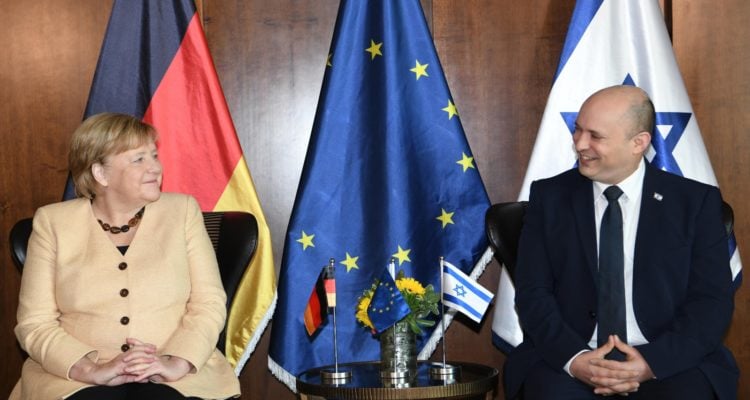The German leader emphasized her country’s solid commitment to Israel’s security as she kicks off a two-day visit.
By Batya Jerenberg, World Israel News
German Chancellor Angela Merkel kicked off her last visit to Israel as head of state by attending a ceremonial government cabinet meeting Sunday and stressing her country’s solid commitment to Israel’s safety.
“I want to use this opportunity to emphasize that the topic of Israel’s security will always be of central importance and a central topic of every German government,” said Merkel, who after 16 years of leading her country decided not to run again in the country’s September elections.
Her Conservative party was narrowly defeated by the center-left Social Democrats, who are in the midst of negotiating a coalition that could put her party in the opposition. Merkel thus found it important to make it clear that she believes that although the government may change, its attitude to Israel would not.
She also called it “a great pleasure and great honor to be able to visit Israel once again” at the end of her term in office.
Before the cabinet meeting began, Prime Minister Naftali Bennett expressed Israel’s deep appreciation for Merkel’s “ongoing friendship and commitment to the people of Israel,” saying that “The relationship between Israel and Germany has been strong but in your term it has never been stronger.”
When talking of the danger Iran and its nuclear ambitions posed to Israel as well as the rest of the world, he stressed that its uranium enrichment program “is at its most advanced point ever,” and that Israel will not let the Islamic Republic have nuclear weapons.
“For us, this is not a strategic issue, it is an existential one,” Bennett said.
“There is no point in trying to appease the Iranians, they interpret conciliation as a weakness. They continue to thrive in the international community, buying time and constantly advancing uranium enrichment, and destabilizing the region. This is a critical point, and Germany’s position is particularly important,” he noted.
Turning to Merkel, he said at one point, “Whoever stays neutral in a conflict between Israel and countries like Iran and organizations like Hamas and Hezbollah lost his moral compass. You, Chancellor, have served for years as the moral compass of the entire continent of Europe, drawing an uncompromising line of support for Israel.”
This support has come “in words, and more importantly, in deeds,” he said.
In the following press conference, Merkel stated in reaction, “Iran must return to the negotiating table as soon as possible,” to reinstate the nuclear deal. Meanwhile, Bennett has gone on record saying that Iran’s progress in uranium enrichment makes the original deal worthless, as Tehran’s nuclear capabilities have grown exponentially since former president Donald Trump walked away from it in 2018, slapping heavy economic sanctions back on the country.
Meeting with the Chancellor later on Sunday, Foreign Minister Yair Lapid thanked her for “never hesitating in [her] fight against antisemitism,” adding that “if Israel and Germany can manage to sit down and talk than the world still has a bright future ahead.”
Merkel will continue her position as head of state until a new government is formed. The German spokesperson said that Merkel will be discussing various security issues with Prime Minister Bennett and others during an extensive meeting Sunday. Other topics will include cooperation against the COVID-19 pandemic, trade, and assistance to Holocaust survivors. Merkel will be meeting with high-tech entrepreneurs to end the first day of her two-day trip to the country.
In another symbolic move, Merkel will also revisit Yad Vashem, the World Holocaust Remembrance Center, during her stay.
_____
Tobias Siegal contributed to this report.




